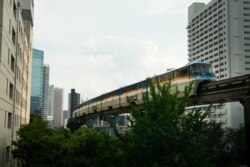In less than two weeks, Courtney Frerichs will face off in Tokyo against some of the world’s fastest runners. But like every elite athlete preparing for the Summer Olympics, her focus is not only on preparing to compete.
Frerichs, a middle-distance runner from the United States, is also using the final days of her training to make sure she complies with the elaborate set of rules meant to ensure the Tokyo Games don’t become a COVID-19 superspreader event.
“It’s a lot,” Frerichs told VOA in a recent phone call between training sessions in Portland, Oregon. “We’ve just been trying to review the protocols and everything to make sure that we’re checking all of our boxes and getting all the stuff done, just prior to arriving in Japan.”
Frerichs, who is competing in the steeplechase event in Tokyo, is quick to point out that she understands why the rules are necessary.
“But it certainly adds another level of stress to everything,” she said, laughing. “Like the Olympics wasn’t enough.”
Athletes like Frerichs shrug off the suggestion that COVID-19 regulations, along with other precautions such as the absence of cheering fans, will hurt their performance. But one thing is certain: this Olympics will feel different than any other.
Do’s and don’ts
The official rules for athletes are laid out in a 70-page “Playbook,” which basically reads like a gigantic bummer.
“You should eat alone as much as possible,” warns one section. “You must not walk around the city,” cautions another.
Hugs, high-fives, and handshakes? Not at this Olympics. Alcohol isn’t allowed either, unless athletes consume it inside their rooms at what will surely be a quieter than usual Olympic Village.
For athletes and officials, the planning must begin long before the Olympics. Certain rules, such as social distancing and regular health checks, apply for 14 days before they arrive in Tokyo. Athletes also must submit a detailed “activity plan,” explaining where they will be at every moment of every day.
Once an athlete’s competitions are complete, they are required to leave Japan within 48 hours.
“We come in, we have a job to do, and then we leave. I literally depart the next day,” Frerichs said.
The ‘No Fun Olympics?’
Given the restrictions, and the fact the Games are being staged amid a global pandemic, some news outlets have labeled it the “no fun” or “cursed” Olympics.
“‘No Fun Olympics’ will be right,” predicts Jack Tarrant, a Tokyo-based freelance journalist. Two weeks before the Games, Tarrant says he’s witnessed “almost no enthusiasm at all” in Tokyo.
“There’s very little visually you see on the street, any sort of banners or welcoming signs for foreign visitors or athletes,” Tarrant told VOA. “It’s … very different from any other Olympics experience I’ve had.”
Opinion polls for months have suggested most Japanese oppose holding the Games, which were delayed a year because of the pandemic. Concerns were heightened after a recent surge in COVID-19 infections, prompting a state of emergency in Tokyo.
As a result, Tokyo will host no public viewing areas for the Games. The capital will see no torch relay and will request that bars and restaurants refrain from serving alcohol.
That’s a sharp contrast from other Olympics, where celebration is a main component — even for athletes, notes Tarrant.
“There won’t be the usual time to unwind with the other athletes and have a well-deserved celebration after four, or in this case five, years of preparation,” he said.
There will perhaps be fewer chances for other types of recreation, too, organizers hope.
At every Olympics since 1988, athletes have received condoms, in a tradition that began as an effort to prevent the spread of HIV. At this year’s Games, athletes will only receive condoms upon leaving the Olympic Village.
Business, not pleasure
But David Gerrard, a former Olympic swimmer from New Zealand, tells VOA that the athletes’ focus will be on competition.
“Anybody who thinks these are going to be the ‘boring Olympics’ really has got the wrong idea of what the Olympics is all about,” said Gerrard, who will be working as a COVID-19 liaison officer in Tokyo.
“They’re not a meeting of people who want to sight-see or shop. They are an accumulation of the world’s best athletes who are there to do one thing and that’s to perform to the best of their ability,” Gerrard said.
Gerrard should know. He first competed at the Tokyo Olympics in 1964. This will be the 11th Summer Olympics at which he has competed or attended.
“Things will be very, very different” this year, he concedes. “But like the athletes, I’m not there for a holiday.”
Athlete performance
But will the rules, and specifically the empty stadiums, mean athletes will lack the motivation needed to fuel spectacular performances?
“Crowds are always a factor, no doubt,” Gerrard said. But crowds or not, athletes “will not underestimate the fact that they are at the Olympic Games competing against the world’s best, and I think they’ll focus accordingly,” he predicted.
Another factor: a year and a half into the pandemic, athletes are now more accustomed to performing without fans and dealing with other COVID-19 precautions.
“There is certainly going to be a missing element,” said Frerichs, who feels the crowd was a factor in what she views as the best races of her career.
The challenge in Tokyo, she says, will be largely mental — “just trying to remember all the training days when it was just you and coach out there, and you got the job done,” she added.
Frerichs says in some ways she’s approaching the Games like a business trip.
“Which is definitely not how I envisioned it,” she said. “But that’s OK. I always revert back to just being grateful this is happening at all.”











